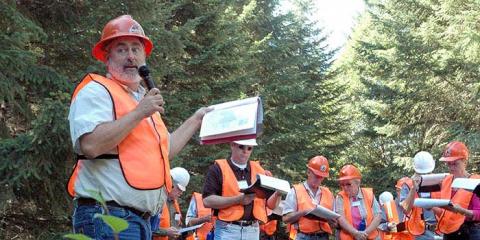Forty years of forestry education in Oregon
June 09, 2021
In 1981, my wife, Teresa, and I moved to Oregon so I could attend graduate school at the Oregon State University College of Forestry. That was the beginning of my long career as a forestry educator in this great state, which will soon come to an end with my retirement this year.
While studying for a Master of Forestry in silviculture, I served as a teaching assistant for forest ecology and silviculture classes, working with the professors John Tappeiner and Dick Hermann. With mentors like them, I caught the bug for teaching forestry and learned that it was an area in which I excelled.
Upon graduation in 1983, I went to work as the first tribal forester for the Confederated Tribes of Siletz Indians of Oregon. The tribe had recently had their tribal status restored and were beginning forest management on their new reservation. As the tribe’s forester, I got to write silvicultural prescriptions, manage timber sales, supervise spray and reforestation projects, and even got to write the Siletz Indian Reservation’s first forest management plan. I had the chance to supervise and train tree planting, thinning and inventory crews, and generally practice intensive silviculture in Oregon’s Coast Range. However, when a forestry extension agent position opened in Douglas County, I knew that I had to apply to try and get into forestry education full time.
I worked for the Oregon State University Extension Service in Douglas County for six years before transferring to the Lane County Extension office in Eugene, where I continued by post-graduate studies at the University of Oregon. I was in Eugene for five years before moving to the Oregon State University campus in Corvallis, where I worked as the director of outreach for the College of Forestry for the next six years.
During my time at OSU, I had the opportunity to work with hundreds of woodland owners and professional foresters. I taught dozens of workshops and coordinated numerous forestry conferences. I also worked with many K-12 students and did a bunch of public education.
In 2003, I was asked to apply for a position with the Oregon Forest Resources Institute (OFRI) as the director of forestry. I had worked on several OFRI projects while at OSU Extension and was very supportive of OFRI’s mission to educate Oregonians about forestry. After 16 years of forestry extension, I was ready to play on a larger stage. It was a hard decision to walk away from a tenured full professor position, but I was ready.
Working as OFRI’s director of forestry for the past 18 years has given me a tremendous opportunity to communicate to the people of Oregon the importance of forestry: What it is, why we do it and why it matters. Being the face and voice of active forest management in the most important forestry state in the country has been an incredible opportunity. I have had the chance to teach many more classes, write several educational publications, star in a handful of informational videos, and help lead an incredible organization.
OFRI’s mission of educating Oregonians about forestry has become my personal mission. I have loved every minute of spreading the forestry gospel and believe that we have made an incredible difference through our work. I have had the opportunity to work with a team of professional communicators, educators and foresters, aided by adequate resources and tremendous forest sector support toward an end that I really believe in.
Thank you for the opportunity to serve you for the last 40 years. The time has gone way too quickly. I hope and pray that OFRI continues for a long time and continues to receive the support of the forestry community in Oregon. Thanks for the memories.
For the forest,
Mike Cloughesy
Director of Forestry
